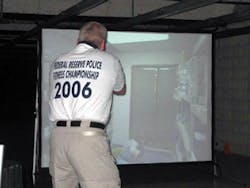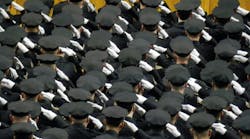Video-based judgment simulators... they're ubiquitous; every agency and department seems to either own one, or they share one with another agency. Simulators are another key element of what goes into building a well-rounded training program, one that may save a life. But how good are they, and can they really have a profound impact on officer survival? Let's explore, together.
There are several reasons why these electronic training aids are important. One of the best is that they give trainers the ability to expose their students to the exact same scenario each time. Every officer sees the same set of circumstances, the same bad guy, all in the same environment. Why is that key? Because as a trainer, I can then identify common themes that present themselves - both good and bad - and address these issues in future training.
For example, perhaps after seeing my fifty officers go through a simulator session, I discover that only half of them routinely announce their office. Many will say, I'm in uniform. It's not necessary. That's a problem because we never know who we're dealing with... maybe the subject is an illegal immigrant who perhaps doesn't recognize our uniform as representing the police (the TSA ensemble has been changed to mimic the police), even though to us it's a no-brainer.
The simple use of the word POLICE is recognizable the world over. It removes any doubt as to who we are. It also makes clear to both any eye witnesses and ear witnesses that the police are at work. If you've ever had to justify your actions in front of a jury, you'll agree that having citizens verify that you ID'd yourself can eliminate many problems. So I may decide to make the ID issue a topic at a future role call or other in-service training.
Another reason why simulators are an important component of department training is the ability to observe an officer's reaction, as well as the time that it takes for them to react. If they are slow to pick up on threats, I know that as a trainer I need to go over that topic in the future. If when they do react, their performance if slow or poor, then that's another area that I need to concentrate on.
So many training issues can be identified by using a controlled training situation that simulators provide, that one could probably base almost their entire year's training calendar on just one session. But the key is this: the simulator itself doesn't supply all of the information needed to identify and address areas in need of improvement. Rather, it takes a seasoned individual, a sound, principled, pragmatic trainer who can sort it all out and make lemonade out of a few lemons. The key factor, then, in simulator training is: the trainer.
If you are fortunate enough to have a simulator that has a capture feature, i.e., the officer is video-taped during the scenario for the purpose of playback, half of your work as a trainer is done for you. The ability to have the officer view himself during the playback of the scenario is invaluable. It makes the job of a trainer much easier, in that it eliminates much of the verbal judo that typically ensues at the conclusion of a scenario.
Typically, I will point out what the officer failed to do, or perhaps didn't do as well as he could have. This invariably leads to the old sparring match - he says, yes, I did, to my, no, you didn't. To have the capability for the officer to see and hear what they did upon playing back the scenario, allows them to be self-critical. Judging one's own performance leaves a lasting impression, versus a trainer telling an officer what they did wrong.
While we're on the topic of debrief and critique, I need to mention the importance of pointing out not only bad performance, but things that were done well by the officer. So often we focus on the shortcomings - what an officer failed to do or what they did poorly. But just as it is important to identify poor tactics and behavior, so it is also critical to reinforce the things done well.
For example, if I have an officer who comes into the simulator and projects his authority by his presence and voice commands, that behavior needs to be commended and reinforced. When a shooting situation presents itself and the officer correctly goes to cover and uses it in the best tactical manner possible that must also be articulated to him and be reinforced.
It's so easy to get into that negative mode as a trainer. Our eyes and minds are so focused to spot behaviors and deviations from established protocol, that we often times miss opportunities to point out exceptional performances. This is particularly true when it comes to those officers who regularly perform well in training and on the street. We expect them to do things right, so we rarely give praise. It's important to acknowledge a job well done for both ends of the spectrum: those who regularly do well and those who have a difficult time. Both types of officers need positive reinforcement.
Simulators are important training aids, but without the expertise of a seasoned, fair, articulate trainer, they become nothing more than video games. The right trainer, combined with the appropriate scenarios, can take your training to a higher level. Don't ruin the opportunity by getting stuck in negativity. Praise your trainees and colleagues on proper protocol, tactics, marksmanship, and presence. By mixing your debrief/critique with both good and bad, you'll discover a more receptive officer - one who anticipates the next simulator session.
Stay safe, brothers and sisters!



